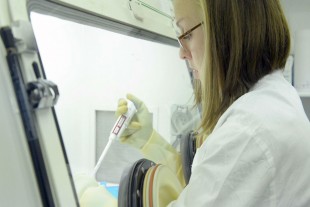Today the Prime Minister announced details of the Ebola medal. We highlight a vital element of the UK military's response that has until now remained out of the spotlight.
Laura was one of 12 microbiologists from the Defence Science and Technology Laboratory (Dstl) who deployed to Sierra Leone to work in Public Health England’s (PHE) Diagnostic Laboratory within the Kerry Town treatment. Laura and her colleagues were responsible for receiving test results from patients and essentially diagnosing whether they had the deadly disease or not.
Here, she talks about her experiences:
As part of my day job at Dstl, I work in high containment facilities with dangerous pathogens and I lead a team who research and develop medical countermeasures. I volunteered to deploy to Sierra Leone and travelled out in mid-November until late December. I was part of a 12 person team, with 3 Dstl colleagues and 9 other scientists from PHE and the NHS.
I was one of two team leaders for the second team to arrive at Kerry Town. We relieved team one, who had opened the lab in October and done an excellent job of getting it up and running from a shell and fixing any problems so that we could hit the ground running.
My role was to prioritise samples, ensure their swift and safe progress through the diagnostic process and report the results to the medics.
My top priority was safety of the lab staff and ensuring everyone got home safely. This meant lots of bleach, skilled manipulation of samples and strict adherence to safety protocols.
Secondly, we aimed to turn the samples round and have them reported as soon as possible: to get the right result, back to the right patient, in order to inform the next decision quickly. This could mean moving a negative patient out of a holding centre away from those with Ebola, or moving a positive patient to an Ebola Treatment Centre, or ensuring safe burials were undertaken for those who had died, to prevent onward transmission.
We were all acutely aware of the life and death nature of the work. We received samples from all ages from the local community: pregnant women, whole family groups, and small children. This drove the team on, at pace, to try to get our results out as soon as we could.
The best days were when we were able to attend ceremonies for patients being discharged from the treatment centre. These were often patients whose samples we had been following in the lab with our fingers crossed. The ceremonies involved singing, dancing and clapping, and were bittersweet for those who had recovered but had lost friends and family to this terrible disease.
For me, this was the biggest challenge I have faced, both personally and in my career. Away from home at Christmas, it was emotionally demanding, and worlds apart from my day job. However, the skills and drills I have honed over six years working in the lab meant I was well placed to make the right decisions in a challenging environment. It was also an incredible opportunity to work with doctors, nurses, soldiers, scientists, logistics and operations experts, different NGOs and agencies, from different countries around the world.
It was an eye-opener to the world of UK military Operations, which I hope to be able to experience again in the future.

